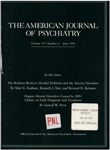Consequences of surveillance of the forensic psychiatric examination: an overview
Abstract
Lawyers have argued that surveillance of the forensic psychiatric examination (either direct observation by a lawyer or recording of the examination) is necessary under certain circumstances to protect clients' rights and ensure more accurate reporting of the findings. Psychiatrists are concerned that surveillance could disrupt such examinations and impair their validity. The author reviews and extrapolates from available data on the effects of tape recording on clinical examinations and psychotherapy and concludes that the current state of scientific knowledge does not allow confident assessment of whether the perceived need for surveillance outweighs the possible impairment of the validity of forensic psychiatric examinations.
Access content
To read the fulltext, please use one of the options below to sign in or purchase access.- Personal login
- Institutional Login
- Sign in via OpenAthens
- Register for access
-
Please login/register if you wish to pair your device and check access availability.
Not a subscriber?
PsychiatryOnline subscription options offer access to the DSM-5 library, books, journals, CME, and patient resources. This all-in-one virtual library provides psychiatrists and mental health professionals with key resources for diagnosis, treatment, research, and professional development.
Need more help? PsychiatryOnline Customer Service may be reached by emailing [email protected] or by calling 800-368-5777 (in the U.S.) or 703-907-7322 (outside the U.S.).



